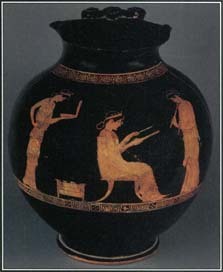Muses
In Greek mythology, the Muses were sister goddesses of music, poetry, and other artistic and intellectual pursuits. Poets and other artists often called on them for inspiration. Zeus, the king of the gods, was the father of the Muses. Their mother was Mnemosyne, goddess of memory. In his role as god of music, poetry, and dance, Apollo* was sometimes said to be their leader. The Muses also

The Muses lived on two sacred Greek mountain peaks, Olympus* and Helicon. Originally they were three—Melete (Practice), Mneme (Memory), and Aoede (Song)—but the Greek poet Hesiod named nine Muses in his Theogony (History of the Gods). Ancient writers, particularly the Romans, often linked individual Muses with specific arts and sciences, but they did not agree on the functions of particular Muses. One widely reconized list identified Calliope as the Muse of heroic and epic poetry and associated Erato with lyric and love poetry, Polyhymnia with sacred songs and mime, Melpomene with tragedy, Thalia with comedy, Euterpe with music played on instruments, Terpsichore with dancing, Clio with history, and Urania with astronomy.
In myths, the Muses often punished or rewarded mortals. Hesiod claimed that they gave him knowledge and inspired him. The Odyssey] tells of Demodocus, a man who was blinded and then given the gift of song by one of the Muses. She claimed that song was even more precious than sight. Although the Muses could be generous, they resented mortals who questioned their supremacy in the arts. The Iliad* mentions Thamyris, a poet who challenged the Muses. They made him blind and took away his ability to sing. Another myth tells of the Pierides, nine sisters who lived in Macedonia, north of Greece. The Pierides challenged the Muses to a contest. The Muses won and then turned their challengers into chattering birds. Some of the Muses had famous offspring. Calliope was the mother of the great musician Orpheus*, and Clio was the mother of the beautiful Hyacinthus.
epic long poem about legendary or historical heroes, written in a grand style
The word museum comes from the Muses. It means "place of the Muses" and was first used for the Museum of ancient Alexandria, Egypt, a center of scholarship and learning.
See also Apollo ; Calliope ; Greek Mythology .
Comment about this article, ask questions, or add new information about this topic: